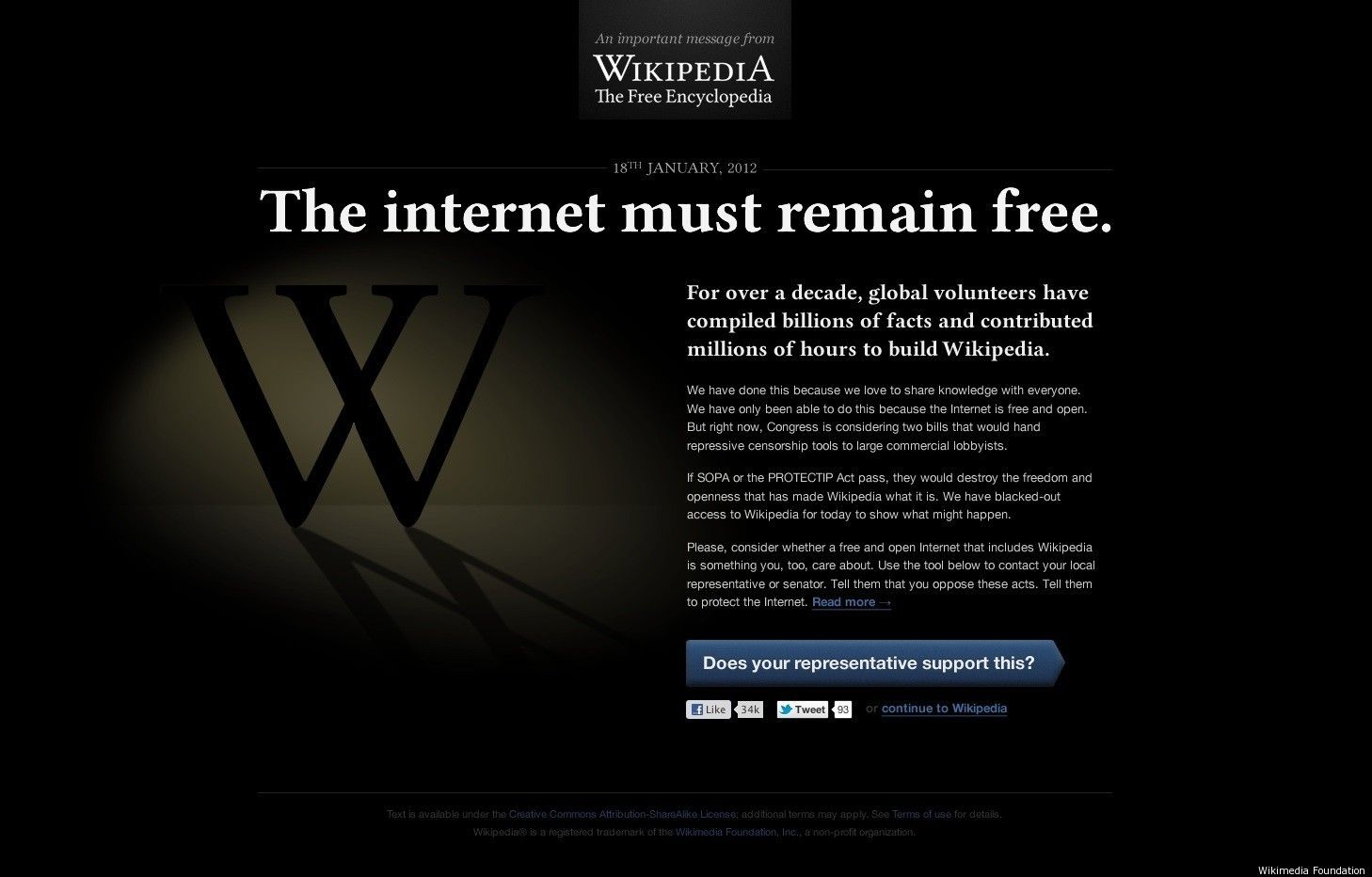“Punting the Pundits” is an Open Thread. It is a selection of editorials and opinions from around the news medium and the internet blogs. The intent is to provide a forum for your reactions and opinions, not just to the opinions presented, but to what ever you find important.
Thanks to ek hornbeck, click on the link and you can access all the past “Punting the Pundits”.
Amy Goodman: The Day the Internet Roared
Wednesday, Jan. 18, marked the largest online protest in the history of the Internet. Websites from large to small “went dark” in protest of proposed legislation before the U.S. House and Senate that could profoundly change the Internet. The two bills, SOPA in the House and PIPA in the Senate, ostensibly aim to stop the piracy of copyrighted material over the Internet on websites based outside the U.S. Critics, among them the founders of Google, Wikipedia, the Internet Archive, Tumblr and Twitter, counter that the laws will stifle innovation and investment, hallmarks of the free, open Internet. The Obama administration has offered muted criticism of the legislation, but, as many of his supporters have painfully learned, what President Barack Obama questions one day he signs into law the next. [..]
When Internet users visited the sixth-most popular website on the planet during the protest blackout, the English-language section of Wikipedia.org, they found this message:
“Imagine a World Without Free Knowledge.
“For over a decade, we have spent millions of hours building the largest encyclopedia in human history. Right now, the U.S. Congress is considering legislation that could fatally damage the free and open Internet.”
In a world with fresh, Internet-fueled revolutions, it seems that U.S. politicians are getting the message.
New York Times Editorial: Online Piracy and Political Overreach
For months, it seemed as if Congress would pass an online antipiracy bill, even though its main weapons – cutting off the financing of pirate Web sites and making them harder to find – risk censoring legitimate speech and undermining the security of the Internet. But the unmovable corporations behind those bills have run into an unstoppable force: an outcry by Internet companies led by Google and Wikipedia that culminated in an extraordinary online protest on Wednesday.
Lawmakers have begun peeling away from the bills, notably Senators Marco Rubio, the Florida Republican who cosponsored the Senate version, and John Cornyn, the powerful Texas conservative. They dropped out after Wikipedia’s English language site went dark and Google put a black bar on its homepage on Wednesday. [..]
We are happy that the drive to pass antipiracy legislation has slowed enough that Congress might actually consider all its implications carefully. Lawmakers can now act wisely to create tools that can help combat the scourge of online piracy without excessive collateral damage.
On December 30, the Montana Supreme Court delivered a New Year’s gift to the nation, upholding a century-old ban on corporate political expenditures in state elections. The decision has gone underreported amidst the hoopla of the Republican primaries-even as super PAC spending skyrockets and there is an emerging understanding of its corrosive impact-but the Montana case sets up the first direct challenge to the disastrous Citizens United decision as we approach its second anniversary.
Free Speech For People – a national non-partisan campaign challenging the fabrication of corporate rights under the US Constitution-filed a friend- of-the-court brief in the Montana case. It led a coalition that included the American Sustainable Business Council, a network of more than 70,000 businesses across the country; the American Independent Business Alliance; and a local supermarket business and non-profit corporation.
George Zornich: Keystone XL Is Dead-Again
For the second time in as many months, the Obama administration has rejected the Keystone XL pipeline – a hugely controversial project that would traverse the length of the country from Nebraska to the Gulf of Mexico, carrying heavy and dirty tar sands oil from deep in Canada. [..]
But Republicans successfully revived the project during the end-of-year negotiations on the payroll tax cut and unemployment insurance. Democrats desperately wanted these measures, and the final bill included a provision that would force the State Department to issue a decision on Keystone within two months.
Today – less than even one month since the payroll tax cut bill was passed – the State Department announced they were denying the permit. In a statement, President Obama endorsed that decision: “As the State Department made clear last month, the rushed and arbitrary deadline insisted on by Congressional Republicans prevented a full assessment of the pipeline’s impact, especially the health and safety of the American people, as well as our environment.”
Leslie Savan: Colbert Raises Cain
Stephen Colbert, the all-but-declared candidate for the president of the United States of South Carolina, and Jon Stewart, the man in charge of the Colbert Super PAC, are not technically, legally, or otherwise coordinating campaign plans-as they stated at one point in perfect unison last night. But in a frenzy of non-coordinatism, these two citizens united to get Stephen on the SC ballot, even though the ballots have already been printed and write-ins aren’t permitted. How? By running an ad equating a vote for Herman Cain, who dropped out of the race in last month but is still on the ballot, as a vote for Stephen Colbert. [..]
It’s only fitting that Cain, whom Rachael Maddow earlier revealed as not a candidate but a brilliant performance artist, play host to performance artist Colbert’s frankly parasitic campaign. After all, the comedic Republican primary, with its clown car full of jokesters (from Romney saying that the $374,000 he made in speakers fees last year is “not very much” to Gingrich’s blowing audible racist dog whistles during the Martin Luther King Jr. Day debate) is as funny as anything out of Comedy Central.
John Nichols: Scott Walker Admits His Defeat Would Stall the GOP’s Antilabor Push
Even Wisconsin Governor Scott Walker was acknowledging Tuesday that the one million signatures that had been gathered on petitions seeking his recall and removal from office were all but certain to force him to face a new election.
Walker still thinks he will win that election.
But if he loses, and polling suggests that is a very real prospect, Walker has admitted that the anti-GOP agenda of Republican governors and presidential candidates will be dealt a blow.
Indeed, Walker suggests, Republican governors will be less inclined to attack public-sector unions. And he suggests that Democratic governors will also recognize that assaults on the rights, the benefits and the pensions of state, county and municipal employees and teachers are politically unwise.
E. J. Dionne, JR.: So Much for a Populist GOP
Members of the tea party insisted they were turning the GOP into a populist, anti-establishment bastion. Social conservatives have long argued that values and morals matter more than money. Yet in the end, the corporate and economically conservative wing of the Republican Party always seems to win.
Thus was Mitt Romney so confident of victory in Saturday’s South Carolina primary that he left the state briefly on Tuesday for a fundraiser in New York City. And why not? The power of big money has been amplified in this campaign by the super PACs let loose by the Supreme Court’s Citizens United decision and lax regulation.
You cannot watch the morning news shows in this state without confronting an intricately confusing blitz of ads, some paid for by candidates, others by the supposedly independent PACs. One kind is indistinguishable from the other.


 Over the weekend the discussion about bills pending in Congress that would change the Internet has started to get some attention. Opposition to
Over the weekend the discussion about bills pending in Congress that would change the Internet has started to get some attention. Opposition to 
Recent Comments